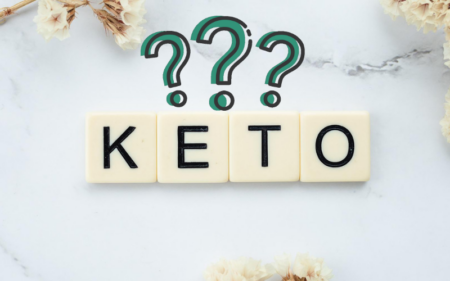
Keto diets have gotten hugely popular in recent years, especially for weight loss. And while initially this approach works, many people find out that they cannot stick with it long-term.
Let’s dive in and explore why keto works and why it isn’t a real solution to any of your health problems.
What is Ketosis
When we eat no carbohydrates, our bodies enter a backup mode called ketosis.
Ketosis is a hugely important biological adaptation that of all primates, only humans have. It has saved our species from starvation by allowing us to be able to fuel our bodies entirely from the fat reserves we have.
Keep in mind, that humans are notoriously bad hunters, no matter what many want to believe. In the last decade, a lot of science has emerged to corroborate that.
What allowed us to survive in harsh conditions was our ability to store calories as fat and then survive for days with no food.
Thank you, ketosis!
What about the health benefits?
Our bodies operate in two modes:
- digesting food and storing it
- using the stored energy and cleansing the system
We cannot effectively enter repair mode when the body is digesting food. That is why fasting (eating nothing at all or an extremely limited number of calories) has proven to be such an efficient modality for healing.
By eating way fewer calories than we need, the body can repair and heal. Short-term fasting is an excellent way to boost your health.
However, fasting depletes your nutrient stores, raises acidity in the body and it’s quite taxing on all systems, if done for a prolonged period.
After fasting, you need to eat a highly alkaline, nutrient-rich, mainly whole plant food diet to replenish your stores and bring balance to the body’s systems.
Staying in ketosis long-term doesn’t allow for that!
All the health & wellness clinics around the world that have been successfully treating patients for decades using fasting modalities follow these principles.
Keto Diets
First, ketosis itself is a largely inefficient way to power the human brain as about 90% of the energy in fats is lost in the process.
Keto diets are proposed as a weight loss method and they work because of the extreme inefficiency of powering the body with ketones and, more importantly, because we fool our body that it is starving!
If we eat nothing but animal flesh, the calories that enter the bloodstream are the same as if we were digesting our own fat stores! To our brain, we are actually in starvation mode.
When the body is fasting, two things happen. First, we feel the so-called ‘keto flu’ since we aren’t eating food and our bodies enter energy conservation mode.
However, after two to three days the brain realizes that there is no food lying around and we start to feel more energetic. It’s because our brain tries to motivate us to go and find some more food. It does that by suppressing our appetite and raising energy levels.
With our appetite suppressed, we feel fine with little food. We lose weight and since the brain thinks we are starving; it expects us to lose weight.
Keto diets allow us to lose the extra weight but the cost of raising the acidity levels throughout the body, depleting our micronutrient reserves, and increasing our risk of developing cancer due to the high levels of animal protein we consume (the World Health Organization has classified meat as a carcinogen!)
Most importantly, ketosis is the body’s backup system for when we are starving. It’s meant as a short-term solution. We don’t want to be in backup mode in our daily lives. It’s dangerous in the long term.
Keto diets are a hack. You lose weight at the expense of long-term health. It works for a while but it’s not healthy!




Hi!
What about a very low-carb diet that is whole food based, rich in vegetables, nuts, seeds, healthy oil and berries? I get my proteins from eggs, fish and some wild meat and focus on consuming a lot of different and colorful vegetables. 100 grams of berries (wild blueberries and black currants) a day is my main source of carbohydrates.
I started eating low carb as I have struggled a lot with brain health and cognitive function, and I have found this to help. I don’t religiously stay away from carbs and might have a meal with some bread/potato/pasta now and then if I am visiting friends or family (or visiting a really good bakery on a seldom occasion!). This works fine in moderation, but I have recently found out that if I do it several meals in a row/a whole or a few days or just eat a lot of carbohydrates, my cognitive function seem to really plummet. My own assumption is that this happens as I am thrown (far) out of fat burning/ketosis, as when I resume to my own diet, or fast to get out of the unfortunate state faster(pun not intended ^_^), I get better again. The state I end up in when eating carbs/lots of it in comparison to low carb, is definitely not good for me as I really struggle. I do however care a lot about my health and want to take the right approach.
When you say that the body perceive ketosis/fat burning as starvation, is this the case even if one consumes enough energy through a lot of fat/are not in a calorie deficit? – Is it still unhealthy, even if one eats nutrient-dense and healthy foods? Do you have any simple tips to a balanced approach?
Best Regards,
Emilie
Hi Emilie,
I am sorry that you are experiencing such health problems.
First, I must point out that the Keto diet was initially conceived when doctors discovered that children with epilepsy responded very well to fasting, and putting them on a fast-mimicking diet (i.e. keto) helped them tremendously.
That said, fat burning for the human body is extremely inefficient and, more importantly, releases a lot of acidic byproducts in the bloodstream.
Also, the body isn’t very well equipped to deal with excess fat and if you overconsume fat, it will start to get deposited in places where you don’t want it to be like on the inside lining of the blood vessels, between the cells of the internal organs, inside the brain and inside the actual cells. To oversimplify, this leads to the development of heart disease, type 2 diabetes, and degenerative brain diseases such as Alzheimer’s. In fact, the gene that is thought to predispose people to Alzheimer’s disease ( APOE-e4) is actually a variation of the gene that controls the removal of fat in the brain. Basically, people with APOE-e4 have a worse ability to remove fat from their brains (and probably develop plaques and Alzheimer’s).
When people eat no food (i.e. fast). the body runs out of its preferred fuel – carbs and starts to burn fat for energy AND selectively consume protein from its tissues for energy as well. I say ‘selectively’ because the body will always remove the tissues that aren’t necessary or less important for our survival first.
Therein lies the incredible healing capabilities of fasting – our bodies are made primarily of fat and protein. When we fast, the body removes what isn’t necessary, what is ill.
What’s more, when we fast, our metabolism downregulates and we use the least amount of energy that can sustain us. The body has no influx of fat or protein. No fat can be stored anywhere because it’s released from our fat storage and consumed for energy.
And the fat that is released in the minimal amount necessary.
Now, compare this to consuming only foods that contain no carbohydrates but only fat and protein. If we are about to live in this way for a long time, we are consuming not the bare minimum we need, we are consuming a lot more and over a longer period of time.
We cannot judge how much energy we need and we are probably going to overconsume since fat stimulates the appetite.
Also, protein stimulates growth (muscle growth, fat cell growth, cancer growth…) and has an acidic metabolism as well.
Now, fasting is done for a small amount of time and has healing effects because we allow the body to do what it is naturally designed to do – consume as much fat and protein from our own reserves as it needs but no more.
Fast-mimicking diets expose the body to a high acidic load for long periods of time and we have to judge how many calories it needs (which most people overestimate). It’s difficult to do right because it’s not natural.
If you overconsume fats, they are going to get deposited where you don’t want them to. Excess protein will stimulate the growth of tissues you don’t want. It’s difficult to judge and this is a huge part of the problem with keto diets.
I think that you are experiencing such great results on a keto diet because you are doing it more or less right and you are able to control your symptoms.
Still, if the moment to eat something else, the symptoms come back, the keto diet is probably like a band-aid and not exactly healing the underlying issues.
What is the perfect diet, though?
Humans are designed to eat plant foods (you can watch this https://www.youtube.com/watch?v=NMN1Zo_c7_A )
In my opinion, the perfect diet consists mainly of green vegetables, especially sprouts.
Greens are the perfect food, they are low in calories and richer in nutrition than any other food.
So, in a perfect world, you need to be consuming 10 or more servings of (mostly raw) greens per day and any other vegetables as well.
Then come legumes and whole grains. Steamed or boiled, not roasted, baked or exposed to dry heat. These are the perfect sources of calories.
Fruits are great but if you think you have carb sensitivity, you might eat them in moderation.
Nuts/seeds in moderation as well. Walnuts, flax and chia are the best.
In the end, I would advise you to seek a free consultation with Alan Goldhammer from the True North Health center. I think that he is the best person to help you.
All the Best
Venny